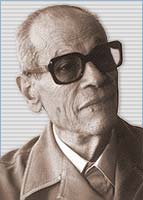
Puja holidays come near.
Sunshine is draped in the colour of Champa flower.
The air ripples with dew,
Shiuli's fragrance touches
like the delicate caress of someone's cool hands.
The sky is lazy with white clouds—
seeing which, the mind doesn't feel like working.
Mastermoshai continues to teach
the primitive story of coal.
Sitting on the bench, the boy paddles his feet,
sees images in his mind—
The cracked ghat of Kamal pond,
And the fruit laden custard apple tree of the Bhanjas.
And he sees in his mind's eyes, the zigzag path
that leads from the milkmen's neighbourhood
by the side of the haat,
into the tishi fields, next to the river.
In the economics class at college
the bespectacled, medal-winning student
jots down a list
which recent novel to buy
which shop will give in credit—
the sari with the "Do Remember" border,
shakha washed in gold,
a pair of red velvet chappals, handcrafted in Dilli
and a silk cloth-bound poetry book,
printed on antique paper—
can't remember its name yet.
At the three-storied house in Bhabanipur
a menagerie of shrill hoarse voices talk—
This time will it be
Dalhousie or Puri,
or that ever familiar Darjiling?
And I see, on the red path that leads to the station
five or six lambs tied with ropes,
their helpless cry spreads across
the calm autumn sky that lilts with the brushing kaash flowers.
How do they understand
their puja holidays are nearby?
Mastermoshai = Respectful term for teacher (Bengali)
Ghat = Bank
Haat = Weekly village market
Tishi = Linseed
Shakha = White bangle made of a particular stone. Is worn by married Bengali women.
Chappal = Footwear











